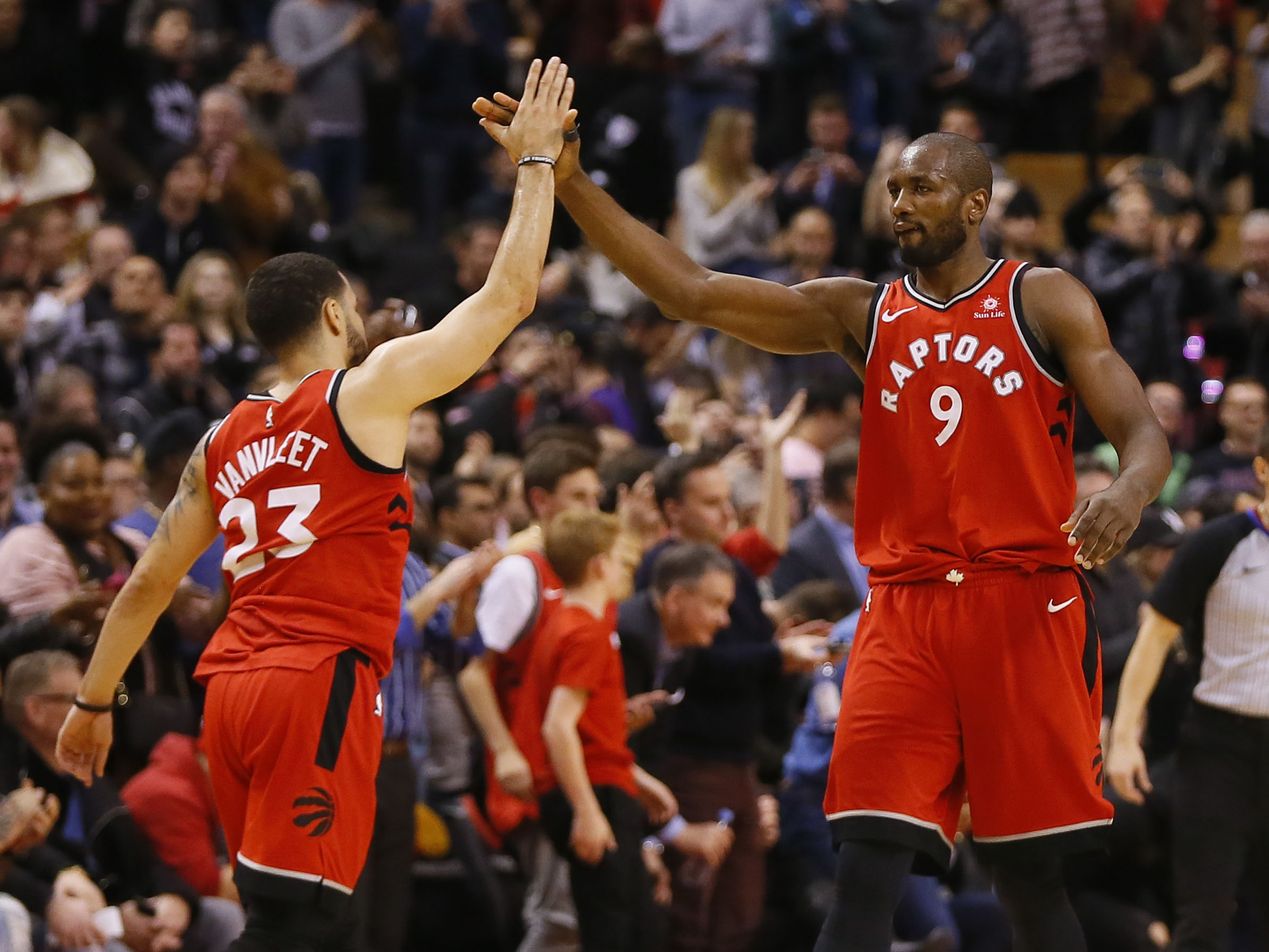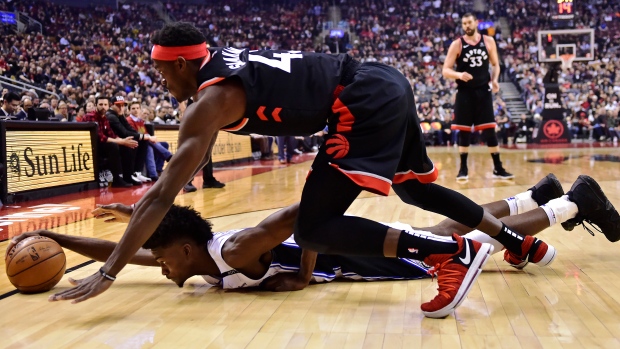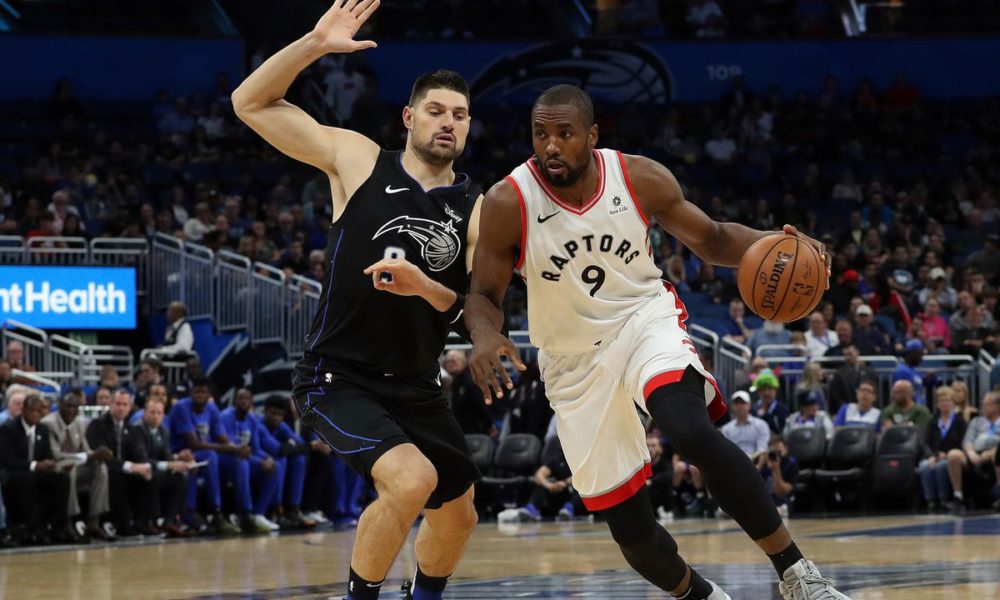For the past few years the Toronto Raptors have entered the NBA Playoffs with the opposite problem, possessing a strong bench with less than ideal starting talent. Last season, the Raptors entered the playoffs with the best bench in the NBA, and the skeptics who argued that benches become less important in the playoffs were proven right when the Raptors were swept by LeBron James and the Cleveland Cavaliers in the second round.
This time around, with the additions of Kawhi Leonard, Danny Green, and Marc Gasol, as well as the emergence of Pascal Siakam as a legitimate star, the team’s talent level is the highest it’s ever been. In 14 games together, the starting lineup of “Leonard, Green, Gasol, Kyle Lowry and Pascal Siakam are outscoring opponents by 12.2 points per 100 possessions and scoring at a rate of 119.5 points per 100 possessions, which would easily lead the league,” according to The Athletic’s Eric Koreen. The Raptors, for the first time in a long time, have the star power to go up against the very best teams in the league. And as Koreen points out, “An effective starting lineup is a staple of most very good teams. The Raptors of the last few years, and teams that generally excelled based on their depth and had a number of effective bench-heavy minutes, were exceptions.”
Yet, one of the biggest narratives heading into the playoffs is that the Raptors bench is a big problem. And while it is true that their bench has been underwhelming throughout the regular season, with Nick Nurse unable to find reliable hybrid starter-reserve lineups, it shouldn’t be as much of a concern come playoffs. Here’s why:
A Shorter Rotation
Nurse will likely shorten his rotation to eight or nine players for each series with Fred VanVleet, Serge Ibaka, Norman Powell, and OG Anunoby coming off the bench in some order (Anunoby will miss the first few weeks of the playoffs due to an emergency appendectomy).
Nurse has been very open about playing different guys more depending on what the matchup dictates, and the Raptors not having a ‘Bench Mob’ this time around may end up being a blessing in disguise since players have less-defined roles compared to last year due to the lineup and rotation tinkering Nurse has played with throughout the regular season (partly due to injuries and trades; partly due to gathering as much information as possible). Bench players should therefore have an easier time being injected into whatever lineup the matchup dictates, and Nurse will likely adjust throughout each series.
Regardless of how prepared the reserves should be to jump into any lineup, the numbers indicate that they have been outplayed all season. In fact, since the trade deadline, Fred VanVleet is the only Raptors bench player (min 75 minutes) with a positive net rating and the Raptors have been outscored as a team when Siakam, Lowry, and Leonard all sit. As Koreen outlines nicely in this piece, the Raptors hybrid lineups have been unreliable, giving up leads even after Nurse tightened up his rotation in recent weeks.
However, when we dive a little deeper into the numbers, it is clear that the Raptors only really struggle when they play zero or one starter with their reserves, something that is less necessary in the playoffs. The chart below shows the net rating in relation to the number of starters (defined on a game-by-game basis) on the floor (compared to the Raptors first round opponent, the Orlando Magic), demonstrating that while the units with zero or one starter have -10.7 and -5.9 net ratings, respectively, they have an almost even net rating of +0.6 points per one hundred possessions with two starters on the floor, and are very good with three and four starters on the floor, posting perspective net ratings of +5.7 and +9.2.
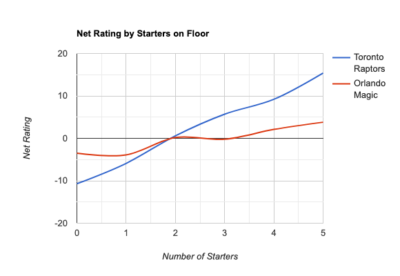
To break it down even further, Nurse’s experimentation has yielded important results regarding the Raptors core four of Lowry, Green, Leonard, and Siakam. The chart below demonstrates that the Raptors should be fine if at least one, but preferably two of those guys is on the court at all times.
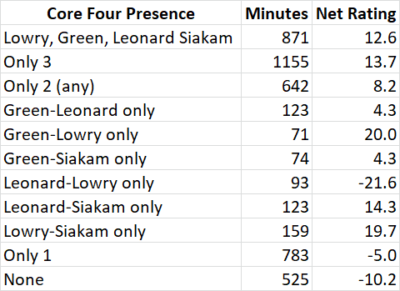
Although it might sound unrealistic that relying more on his starters and shortening the bench will improve the team drastically, the frequency numbers show that Nurse experimented so much in the regular season that he played almost 25 percent of regular season minutes with either zero or one starter on the floor (starters defined on a game-by-game basis). This is partly due to injuries to key contributors, but it is a lot more than potential opponents the Philadelphia 76ers and Milwaukee Bucks who played just 8.2 percent and 13.8 percent of their minutes with zero or one starter, respectively. Nurse can bring that 25 percent number down to close to zero in the postseason, where he can rely much more heavily on his well-rested starters, and that should be a huge advantage.
In summary, a shorter rotation should help these Raptors more than it helped past iterations of the team, and more than it will likely help their Eastern Conference opponents.
Proven Players
My initial reaction to the ‘Raptors bench is a problem’ narrative going into the postseason was simply that the players likely to be coming off that bench are not only extremely talented and reliable, players many teams would be happy to start, but they are also playing their best basketball down the stretch and are proven playoff performers. I am talking, of course, about Fred VanVleet, Serge Ibaka, and Norman Powell (who Nick Nurse indicated was “going to be involved for sure” in the playoffs).
Since the All-Star break, VanVleet has been the Steadiest Freddy of his career, averaging 12.5 points and 5.6 assists while committing just 1.3 turnovers and shooting an incredibly efficient 42.1 percent from three. His ability to command the floor and create ball movement while also running a two-man game with either Ibaka or Gasol will be incredibly important method for the hybrid lineups to score in the playoffs.
Ibaka, since the All-Star break, has averaged 12.3 points per game with a 41.2 three point percentage and an incredible 59.1 true shooting percentage while mostly coming off the bench. He is also averaging 8.5 rebounds and 1.6 blocks per game. Both his three point shooting and his rebounding will be very important in playoffs, where he will be relied upon to play minutes against dominant big men like Nikola Vucevic and Joel Embiid. Fortunately, Ibaka has 109 playoff games under his belt, most of which he started, and his veteran experience will be relied upon.
Powell is another guy heating up down the stretch, averaging 8.9 points, 1.3 assists, and 2.9 rebounds in a limited role since the All-Star break while shooting 50.5 percent from two, 48.4 percent from three, with a 61.7 true shooting percentage. Ever since coming back from a shoulder injury in December, Powell has earned his minutes, steadily improving every game and earning himself a rotation spot just in time for the playoffs. Additionally, Powell has already proven that he can be a difference maker in a playoff series and step up in big games, where is is not afraid of the bright lights.
“He can be the sixth guy one night, the ninth guy one night, and the seventh guy another night,” Nurse said of Powell, “He’s an athlete, so he can make some high-level, high-energy plays. He’s really believing in his shooting, so he’s going to take them… He can make big plays in big games.”
“It’s really easy for me now to just go out there and play, not think about anything, let things come to me, and just play within the offence,” Powell said. “The offence is going to create a bunch of opportunities for me and the team. While the ball is moving, and we’re moving around, the ball is going to find you.”
VanVleet, Ibaka, and Powell are three smart and talented players who are blossoming in Nurse’s system at the best time possible. Then there is perhaps the team’s biggest X-Factor heading into the playoffs, OG Anunoby. As Koreen outlined, “Between the sudden death of his father during the pre-season which has necessitated two extended absences from the team, not to mention untold emotional stress, and Siakam soaking up a lot more minutes than expected, Anunoby’s year never really got off the ground.” However, at 6-foot-8, 232 pounds, with a 7-foot-2 wingspan, Anunoby is a gifted defender who has been playing better on that end of the floor down the stretch. Despite his unimpressive offensive numbers this season, Anunoby did hit 13 of his 29 three-point attempts in last year’s playoffs while doing a good job guarding LeBron James. Certain matchups will dictate Anunoby playing specifically because of his defensive size and switchability (think Siakam at center lineups, for example). He can add a lot of versatility to the rotation if he can bring it on both sides of the floor when he returns to the lineup.
Versatility
We know the Raptors have good players coming off the bench and that those players should get more time playing with starters in the playoffs, which has typically yielded good results. Still, it will be up to Nurse and the coaching staff to maximize the strengths of the Raptors hybrid lineups consistently in order to put them in the best position to succeed. If the Raptors bench can at least play opposing benches to a draw, the Raptors should have a chance to win every night.
The Raptors are one of the most versatile teams in the league top-to-bottom, and that can be a blessing and a curse. It will be up to first year head coach Nurse to maximize the effectiveness of his players, but with so many options to work with it won’t be easy for Nurse to make the right in-series and in-game adjustments, something his predecessor Dwane Casey was ultimately fired for failing to do.
“I like ’em all, I like ’em all,” Nurse said of the hybrid lineups. “I think we’re versatile. I think all those guys can play. I think all those guys want to play, they need to play and it’s up to us to adjust to which ones are out there.
“Finding who’s playing (well) on the night, finding the mismatches and all those things, it’s part of why we’re doing so many (lineups) — you never know what you’re going to have to see. Us being able to adjust to our own different offence and (defensive) lineups, the coverages change with who’s in there, the offensive sets are changing depending on who’s in there and we have to be able to do it on the fly quickly.”
Nurse will tinker with his rotations because he has the players to do it and the mindset to pull it off more so than most coaches. He can throw out so many fundamentally different looks including playing one traditional big man at a time (which he has preferred throughout the season), playing Ibaka and Gasol together, or playing smaller lineups with Siakam at the five (and OG likely at the four). He can split minutes between Lowry and VanVleet or play them together in two or three-guard lineups. He can close out games with the hot-hand or do it with his starting group. His adjustments will depend on many factors, but it is also important for Nurse to play his style and make the other team adjust to him, rather than it only happening the other way around.
The pressure is on Nurse to make it work in the playoffs, maximizing the effectiveness of one of the best rotations in basketball. The message all season has been that he’s willing to experiment at the cost of a few regular season wins in order to be best prepared for the playoffs. Well, the playoffs are here, and Nurse, despite being in year one of his contract, has enormous expectations and a long, difficult road ahead of him. If he is able to maximize the effectiveness of his players and make the right adjustments, though, he might be rewarded at the end of it.


